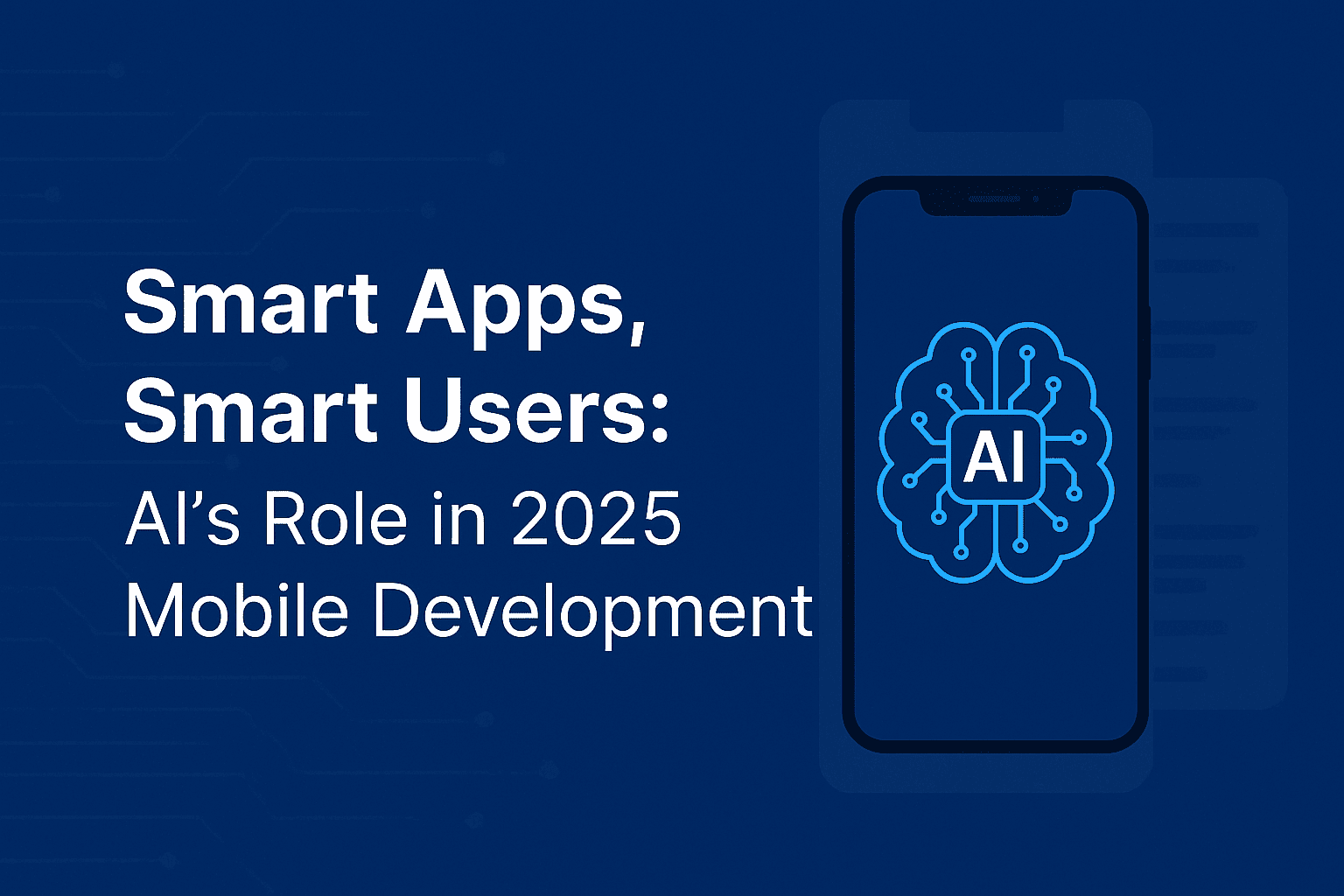Let’s face it—2025 isn’t the future anymore; it’s right here, and it brought a suitcase full of intelligent apps, predictive algorithms, and… surprisingly accurate food delivery suggestions. At KanhaSoft, we’ve seen a major shift: mobile app development has evolved into something far more cerebral. (And yes, that means your app is now possibly smarter than your cousin who still thinks 5G causes headaches.)
In this blog, we explore the evolving world of AI mobile app development, highlight how smart apps are reshaping the way users interact, and dig into why you (yes, you) should care about this revolution. Spoiler alert: AI isn’t stealing your job. It’s just giving your app a serious IQ boost.
The Rise of Smart Apps — Where We Are in 2025
Back in 2015, we were thrilled if an app didn’t crash while opening. Fast-forward to 2025, and AI-powered mobile apps are not only running smoothly but learning from your behavior, predicting your needs, and sometimes even finishing your sentences. (Looking at you, chatbots.)
We’ve gone from static interfaces to AI mobile app development services that offer dynamic, personalized experiences. For instance, mobile apps now use natural language processing, image recognition, and predictive analytics to make decisions in real time—no more waiting for developers to update every tiny interaction.
As we often say at KanhaSoft: “It’s not just about coding smart; it’s about building smart.”
How AI is Shaping Mobile App Development
We get this question a lot: “So, what does AI really do in mobile apps?”
Let’s break it down, KanhaSoft-style:
1. Hyper-Personalization
No two users are the same—unless you’re one of those people with ten burner accounts. AI tracks and analyzes usage patterns, preferences, and behavior to create a truly unique user experience.
From personalized content feeds to location-based push notifications (the ones you actually want to receive), AI-powered mobile apps know you better than your mom.
2. Predictive Analytics
Imagine opening an eCommerce app and seeing exactly what you needed—before you even typed it. Magic? Nope, just AI and machine learning in app development doing their job. Predictive models help apps anticipate user needs, offer relevant products, and improve engagement.
One of our clients—a food delivery startup—saw a 32% increase in conversions after implementing predictive product suggestions. We’re not saying AI can read minds, but it’s getting close.
3. Voice and Image Recognition
2025 has made it loud and clear (pun intended): typing is overrated. Thanks to NLP and computer vision, users can now interact with apps using voice commands or images. AI makes this possible by decoding, understanding, and adapting to these inputs faster than ever.
For businesses, this means smarter support systems and for users—well, fewer buttons to press.
4. Real-time Decision Making
Traditional apps wait for user input. AI-based mobile solutions, on the other hand, are proactive. Think fraud detection, smart healthcare monitoring, or AI-enabled navigation systems that reroute you before traffic becomes a nightmare (we still don’t forgive GPS for that U-turn last summer).
AI Development at KanhaSoft — What Sets Us Apart?
We aren’t just another AI mobile app development company. We build intelligent experiences—crafting apps that are both beautiful and brainy.
Using cutting-edge tools and custom frameworks, our team designs solutions tailored to your business goals. Whether it’s an AI-enabled knowledge base, smart automation, or real-time data visualization—we connect the dots where most companies just draw them.
And yes, we’ve had clients come back and say, “Wait, you built that?!” (Yes, yes we did.)
A Quick Anecdote (Because We Love These)
One of our team leads once tried to build an AI feature into a meditation app. It was supposed to detect user stress via typing speed and recommend breathing exercises. It worked—until it flagged every Monday morning message as a “panic attack.”
Lesson learned? AI is only as good as the data it’s fed. But when done right, it becomes your business’s smartest employee (minus the coffee breaks).
Why Smart Apps Mean Smart Users
Let’s not forget the users—those beautiful, impatient creatures who want everything now. Smart apps reduce friction, deliver what users need faster, and keep them engaged longer.
And when users feel understood, they stick around. Which, if you’re a business, translates to retention, referrals, and revenue. (Triple threat, anyone?)
Internal Links That Actually Help
Need to dive deeper into how KanhaSoft can bring AI into your mobile app? Here are some places to start:
- Learn more about our custom mobile app development
- Explore our expertise in AI & ML development
- Build a smarter support system with our AI-enabled knowledge base
Final Thoughts — The KanhaSoft Way
At KanhaSoft, we don’t just follow trends—we translate them into business-ready solutions. In 2025, AI in mobile app development is no longer optional—it’s expected.
So if your app still asks users to log in manually every time… maybe it’s time we talked.
Let’s build something smart—together.
FAQs – AI in Mobile App Development (2025 Edition)
Q1: What’s the biggest benefit of AI-powered mobile apps in 2025?
A: Hyper-personalization. Users love when apps “get” them. AI helps you do just that—faster and smarter.
Q2: How is AI different from traditional app development?
A: Traditional apps respond to input. AI apps learn, adapt, and predict based on user behavior—reducing effort and increasing engagement.
Q3: Can KanhaSoft build AI features into my existing app?
A: Absolutely. We offer AI integration and upgrades without you needing to build from scratch.
Q4: Is AI mobile app development expensive?
A: It depends on the scope—but it’s an investment that often pays off in better user retention, reduced support costs, and higher ROI.
Q5: How secure are AI-powered apps?
A: With real-time monitoring, smart authentication, and anomaly detection, AI actually boosts security when implemented correctly.

Leave a Reply
You must be logged in to post a comment.